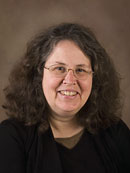Lois Huneycutt - William T. Kemper Fellowships

Department of of History
Students in Lois Huneycutt’s medieval history classes typically write off past individuals, their ideas and concerns as barbaric or backward and less capable of abstract thought than modern people.
Getting students to identify with people of the past whose lives, experiences, assumptions and expectations were different from their own can be a painful task because they will not always be comfortable confronting alien ideas and beliefs. However, Huneycutt believes that challenging students to confront these differences will lead them to listen to and empathize with people who are different from themselves — skills that will serve them all their lives.
In efforts to make her classrooms places where students feel comfortable interacting with each other and with her, Huneycutt employs a mixture of teaching techniques such as assigning group and individual projects that include oral reports, in-class debate and role-playing exercises in which students take on personae of people in the past.
For Huneycutt, teaching and learning do not stop in the classroom. She urges students to take advantage of outside lectures and events and do guided research. She encourages her best undergraduate students to present the results of their research at professional conferences, and she works with graduate students to reduce their seminar papers or aspects of their theses into presentable form, encourages them to submit these papers to scholarly conferences, and takes them with her to such conferences.
Huneycutt’s commitment to scholarly outreach is evident in her willingness to share her expertise in the community whether with home schooled students engaged in the study of Christian history, senior citizens preparing themselves to see the Dead Sea Scrolls on exhibition in Kansas City or a women’s book club reading a novel about Mary Magdalene. “Continued enthusiastic participation in this broad community of learning, both inside and outside of the classroom, illustrates my teaching and learning philosophy and defines who I am as a scholar and a teacher,” Huneycutt says.
Jonathan Sperber, chair of the history department, calls Huneycutt “the model of an intellectually and personally engaged faculty member.”
Huneycutt received a bachelor’s degree in history from the University of California-Riverside in 1984 and a master’s degree in history from the university in 1986. She earned a doctorate in medieval European history from the University of California-Santa Barbara in 1992.